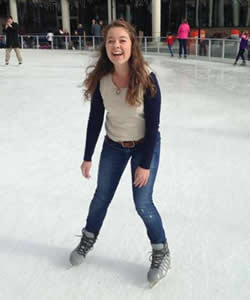This blog post marks one month since the Charlie Hebdo attacks in Paris on January 7, 2015 and the other attacks that followed. By this point, you’ve no doubt been flooded with videos, news reports, op-eds, and Facebook posts about this subject. By this point, a lot of that digital “noise” has quieted down. In the wake of the crisis, I hope to provide some insight into my experience of living in France as the events in Paris unfolded.
For me, most of January 7 was just another day of university orientation in Lyon, France. It wasn’t until my mom FaceTimed me in the evening that I realized that a targeted terrorist attack had occurred. After a day of unintentional isolation from the news, I joined my host family watching the news about the day’s horrors and the vigils for victims. A journalist stated, “It was Voltaire who was killed today.” My host mom commented that Americans must understand what the French were going through. Thousands of people gathered with candles, pens held aloft, and the now familiar “Je suis Charlie” signs that were omnipresent less than 12 hours following the attacks that morning. And by omnipresent, I mean that the entire country had mobilized around this one symbol and displayed it everywhere: graffiti on the streets, Facebook profile pictures, signs in windows, and huge banners hanging from university and administrative buildings.
Over the next few days, the television stayed on. President Hollande held a minute of silence and professors opened the classroom up to questions. A lecture about laïcité (French secularism) took on new meaning. We mourned more losses, from hostages to counter-attacks against Muslims in France. Security measures were implemented at the university that lasted the month of January. Police were everywhere.
On Sunday, January 11, the Marche Républicaine represented two aspects of the French sentiment about the attacks: 1) the French “remained mobilized”; and 2) “même pas peur” (“I’m not a bit afraid”). In Lyon, the metro was free all day on Sunday for the march. Empty metro cars on reserve were sent to cart the throng of people to the starting point of the march. However, so many people had assembled that everyone had to exit the metro one stop early. Parents placed signs on strollers or put their kids on their shoulders for a better view. Waves of clapping accompanied Charlie cartoons, the flag of Israel, and a sign stating, “I am Charlie, against Islamophobia.” A policeman called from a bullhorn, “We were over 300,000 people today!”
If that Sunday was a day that made French history according to Le Monde, the January 12 edition of Charlie Hebdo continued the discussion. After debate about whether the edition should be published by other journals, it sold out of three million copies before 8 a.m. that Monday. As the international conversation about Charlie advanced, I read a lot of articles in American journals about Charlie’s satire “punching down” and producing negative consequences for an already-marginalized population of Muslim immigrants in France. In the windows of Lyon and other cities across France, however, the “liberté d’expression” (freedom of expression) signs remained.
This week, I had my first real discussion with my host family about the consequences of the Charlie Hebdo attacks in France. From their view, France is bouncing between extremes. On the one hand, supporters of the Front National (the extreme right of the political spectrum) have always been wary (to say the least) of immigrants and Islam. On the extreme left, “laïque fanatics” have made a transition from a laissez-faire attitude about religion in the private sphere to the other extreme of fearing that Islam’s structure poses dangers to freedom of expression. According to my host mom, France has already made “progress” by opening up discussion about religious topics that used to be politically taboo.
However, these conversations seem to lack the nuance necessary to avoid the history of marginalization and radicalization bred by extremist positions. As France moves forward, I hope that we can shape a legacy of Charlie Hebdo that acknowledges historical, cultural, and structural context in all its complexity. As a foreign student just beginning to understand these contexts, I am reminded of the confusion my seven-year old self felt in September 2001. Over the next few months as I grow in my understanding of French culture, it will be interesting to see the path France navigates and how these events will permeate the political and academic memory of France both inside and outside of the classroom.

